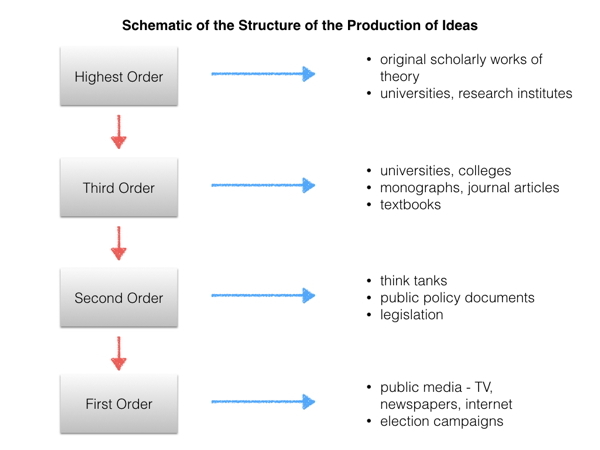
An Historical Examination of Past and Present Strategies used to bring about Ideological and Political Change
By David M. Hart
Date: 18 Feb. 2018; Revised: 8 June, 2018, 13 Nov. 2020
Discussions on this held at the Online Library of Liberty
I orgsnised several discussions of strategic matters in the Liberty Matters online discussion forum. These include two specific examples and a more general one. The goal was to examine two successful attempts to change "the climagte of opinion" (in J.S. Mill's phrase) and to think about might be learned from them:
- John Blundell, “Arthur Seldon and the Institute of Economic Affairs” (November, 2013) <http://oll.libertyfund.org/pages/seldon-and-the-iea>
- Stephen Davies, “Richard Cobden: Ideas and Strategies in Organizing the Free-Trade Movement in Britain” (January 2015) <http://oll.libertyfund.org/pages/lm-cobden>
- David M. Hart, “On the Spread of (Classical) Liberal Ideas” (March 2015) <http://oll.libertyfund.org/pages/lm-ideas>
There are other topics of a similar nature which we could explore in the future, such as
- the anti-slavery movement and the strategies followed by the Abolitionists;
- the activities of the early Christian church in its first 3 or 400 years before it became the state religion of the Roman Empire
- the efforts of reformers during the Reformation to challenge the monopoly of the Catholic Church
- the activities of critics of the “old regime” (whether France or British North America) which lead to the outbreak of revolution in 1776 and 1789 respectively
My own Research on the Matter
I have explored my ideas about strategy and “the production and distribution of ideas” in a more theoretical paper called:
- "Entrepreneurs, Investors, and Scribblers: An Austrian Analysis of the Structure of Production and Distribution of Ideas.” Southern Economics Association, New Orleans, November 21–23, 2015. http://www.davidmhart.com/liberty/Papers/StructureProductionIdeas/DMH_StructureProductionIdeas21Oct2015.html.

Additional Reading on Strategies to Achieve Intellectual and Political Change
- Friedrich Hayek’s pathbreaking essay “The Intellectuals and Socialism” (1949) written at the time of the founding of the Mont Pelerin Society and the renaissance of the classical liberal movement after WW2, in which he reflects on why socialist ideas had been able to achieve so much in 100 years or less: F.A. Hayek, “The Intellectuals and Socialism” (1949) in Studies in Philosophy, Politics, and Economics (Chicago: University of Chicago Press, 1967), pp. 178–94.
- Murray Rothbard’s long memorandum on strategy (1977) written at the time when the Cato Institute had been founded (1974) and when Rothbard was working within the Libertarian Party (founded 1971), and forming the Centre for Libertarian Studies (1976): Murray N. Rothbard, “Toward a Strategy for Libertarian Social Change” (April, 1977). - PDF and HTML versions<davidmhart.com/liberty/AmericanLibertarians/Rothbard/Rothbard_1977TowardStrategy.pdf> ; and Murray Rothbard, “Strategies for a Libertarian Victory,” Libertarian Review, Special Issue on “Strategies for Achieving Liberty” Aug. 1978, vol. 7, no.7, pp. 18–24, 34. HTML version; PDF version.
- the entire issue of Libertarian Review (aug. 1978) with articles by Milton Mueller, Ed Crane, Leonard Liggio, Charles Koch, Bill Evers, and David Theroux: PDF version.
- John Blundell’s book on “waging the war of ideas” (2001): John Blundell, Waging the War of Ideas. Fourth edition. (London: The Institute of Economic Affairs, 2001, 2015).
- Edward Stringham on the strategy for academic change used by Peter Boettke: Stringham, Edward Peter. 2010. “Toward a Libertarian Strategy for Academic Change: The Movement Building of Peter Boettke.” The Journal of Private Enterprise 26 (1) Fall: 1–12.
- Ed Lopez book on “Academic Scribblers” (2013): Wayne A. Leighton and Edward J. Lopez, Madmen, Intellectuals, and Academic Scribblers: The Economic Engine of Political Change (Stanford University Press, 2013).
- Richard Fink’s address at APEE 2015 on “Ideas into Action: Applying Hayek”: Richard Fink’s Plenary Address, ”Ideas into Action: Applying Hayek," The Association of Private Enterprise Education, 40th Annual Conference, Cancun, Mexico, April 12–14, 2015.
Some More Historical Examples to Consider
There have been other groups who have thought long and hard about strategies for achieving radical social change and whose activities would repay close attention by modern classical liberals. Three that come to mind are the American abolitionists in the 1840s and 1850s, James Mill and his group of Philosophic Radicals in the 1820s and 18230s, and Vladimir Lenin in the 1900s and 1910s.
Aileen S. Kraditor, Means and Ends in American Abolitionism: Garrison and his Critics on Strategy and Tactics, 1834–1850 (New York: Pantheon Books, 1969).
Joseph Hamburger, Intellectuals in Politics: John Stuart Mill and the Philosophic Radicals (New Haven: Yale University Press, 1965).
Vladimir Lenin, What Is to Be Done? Burning Questions of Our Movement (1901, 1902). In Lenin’s Collected Works (Foreign Languages Publishing House, 1961, Moscow), Volume 5, pp. 347–530. <https://marxists.org/archive/lenin/works/1901/witbd/index.htm> or PDF <https://marxists.org/archive/lenin/works/download/what-itd.pdf>.